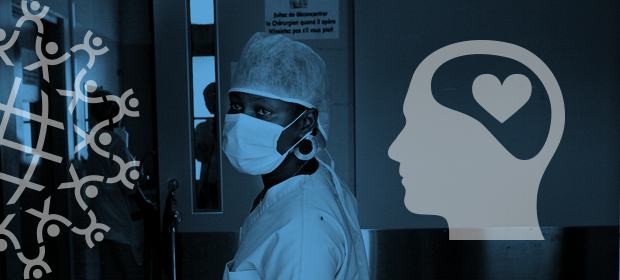Where We Work
See our interactive map


Health workers on the front lines of this pandemic get the help they need for stress, exhaustion, anxiety, and burnout.
"During the pandemic, there have been a lot of stressful moments,” says Juan,* a health worker who helps clients return to treatment after missing their previous appointments. “And those were in addition to continuing to reach the goals of our HIV program.”
It’s no secret that COVID-19 affects mental health and well-being for us all—but especially for health workers. Lack of knowledge about the disease, the spread of misinformation, and fear of contracting COVID-19 have taken a toll on our emotional and physical wellbeing.
Health workers on the front lines of this pandemic experience stress, exhaustion, anxiety, and burnout. At the same time, they’re getting less emotional support, sleep, family time, and time off. They suffer, and so do the health services they provide.
We had to take care of ourselves in the health center.
IntraHealth’s HIV Care and Treatment Project (HCTP) team knew that if health workers on our staff were suffering, so would their clients. So
IntraHealth offered 39 health workers in three countries mental health support through therapeutic sessions with a licensed therapist via phone or video calls to help reduce and manage their work-related stress.“We had to take care of ourselves in the health center, as we were being exposed to clients at the clinic and others who regularly attend outpatient clinics,” Juan says. “IntraHealth provided us with psychological support to help us personally strengthen our attitudes to face this new reality we were living in.”
HCTP also helped health workers get vaccinated, advocated for vaccinations in the community, readjusted health worker workloads, instituted a flexible work policy to support health workers with family responsibilities, and helped them manage stigma, violence, or fear from family, friends, and their communities.
To do all this, the project began by screening health workers in Guatemala, El Salvador, and Honduras. The team then provided therapy to each health worker according to the level of need they expressed in their screening. Across each country, employees who expressed a low need received two sessions of therapy, those with medium need received four sessions, and those with high need received seven sessions. At each session, health workers discussed a variety of topics with the therapists, including how to manage:
And the sessions made a difference.
After the therapy sessions were complete, the project team noticed improvements in the physical, social, emotional, work, and family aspects of the health workers’ lives. The strong emotions many had experienced—such as frustration, anger, sadness, confusion, discouragement, isolation, loneliness, insecurity, and fear—also decreased.
“These sessions allowed us to not just see pure work, but sometimes also the moments to be listened to, moments to smile, to remember that it was not the time to look down on others, but on the contrary, to welcome them,” Juan says. “We had to get closer to people.”Through these mental health services, the health workers learned to balance different areas of their lives and adapt to their new reality. They acquired strategies to assertively manage the stigma they experienced. Their symptoms of anxiety and depression decreased.
This was also helped by the COVID-19 vaccine. After IntraHealth advocated to the Ministry of Health to provide vaccines for its health workers, over 86% of the HCTP health workers were vaccinated as of September 2021, which helps them physically and mentally as they vaccinate other people in their communities.
We’ve seen first-hand that psychoeducation for health workers helps improve their physical and mental self-care at both a personal and professional level while reducing anxiety and depressive symptoms.
Now, health workers across three countries in Central America have the tools they need to be both physically and mentally healthy and can provide the right services for their clients when they need them. And we have the knowledge and tools to scale up mental health services in the region and around the world because investing in the mental health of health workers is an investment in the well-being of the communities they serve.*Name has been changed to respect anonymity.
The HIV Care and Treatment Project is funded by the US Agency for International Development.
Get the latest updates from the blog and eNews




